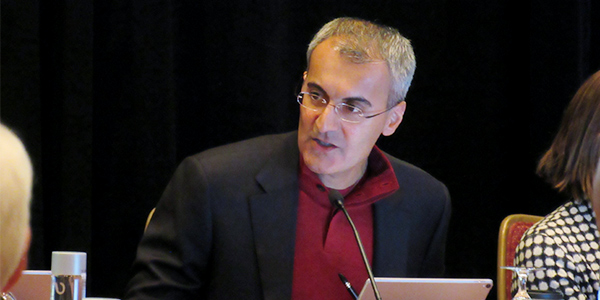MISO executives last week commended outgoing director Baljit “Bal” Dail for his decade-plus influence on the RTO’s technology decisions.
CEO John Bear joked that he was “in denial” about Dail’s departure. He noted that Dail was the founder and sole chair of the Board of Directors’ Technology Committee.
“Bal, you’re the godfather of change to MISO. You challenged us and made us better,” he said. “Every time I needed you, you were available. From the center of my heart, thank you.”
“It’s amazing to think that when I joined the board, there was no technology committee,” said Dail, who presided over his final committee meeting last week.
“He’s been a wonderful influence to this organization, and he’ll be hard to replace,” Board Chair Phyllis Currie said.
MISO selected former PepsiCo Chief Information Officer Jody Davids to replace the term-limited Dail on the board. (See PepsiCo ex-CIO Makes 1st Woman Majority on MISO Board.) Dail served 12 years, three more than technically allowed through a special waiver that allowed the board to retain his technological know-how.
The outgoing director commended MISO on its work so far to gradually swap out its legacy market system for a new, modular platform. The grid operator set up a private cloud this year with non-critical infrastructure protection data and began testing its new market user interface with members.
“He certainly helped and influenced the [market platform replacement] program when we initiated it in 2017,” MISO Vice President of Market System Enhancements Todd Ramey said of Dail.
“Having been someone who has run large IT projects … As the project size increases, the likelihood of staying on-time and on-budget decreases dramatically,” Dail said during the committee’s Dec. 8 teleconference. “This is my last Technology Committee [meeting], so I will not be here when this thing lands, but I feel very comfortable with where we’re at. And anyone who knows me knows I don’t say that lightly. I’ve never seen a project of this size and this complexity land this well.”
However, he said his “passing counsel” would be for staff to look for any efficiencies that could accelerate the completion deadline, even if it does increase costs. He said “project fatigue” could set in among employees on a project with such a protracted timeline.
Virtual Environment Bleeds into 2021
Preparing for a prolonged pandemic recovery, MISO has planned a virtual format for both its March and June quarterly Board Weeks. The grid operator doesn’t anticipate a return to in-person stakeholder meetings until the beginning of July.
“We’re also showing a little bit of optimism by planning our September and December meetings in different locations,” Currie said. “But as you know, things can change, and a lot depends on what we can do as a country to control the pandemic.”
“It’s been a challenging year with external factors,” MISO General Counsel Andre Porter observed.
Currie said MISO’s virtual meeting format for 2020 wasn’t easy to manage.
“But clearly, the MISO community has risen to the challenge,” she said.
“I think anyone would say it’s been an extraordinary year … a year marked by both tragedy and gratitude,” Bear said.
He said nobody could have predicted the popularity of dress-shirts-and-sweatpants combinations, healthy sales of home gym equipment and priceless toilet paper. More seriously, Bear said MISO was rocked by “back-to-back-to-back storms, social unrest, the pandemic and working remotely.”
However, he said MISO has accomplished much throughout the year to address the seismic change in its resources and their times of availability.
MISO Budget Rises in 2021
CFO Melissa Brown said MISO will finish 2020 under budget because of reductions in travel and training expenses and a higher-than-normal employee vacancy rate, all driven by COVID-19.
MISO estimated it will spend $257.1 million in base operating expenses by year-end, almost $8 million lower than the $264.7 million it was allocated.
On the other hand, staff said they would finish 2020 slightly over its $50.2 million project investment budget, at $50.8 million. Brown said the market platform replacement and building renovations drove the overage.
In 2021, the grid operator is planning a nearly $380 million total budget, a 3.2% increase over 2020. Base operating expenses will take a $270.7 million share of the budget. The budget also calls for $50.1 million in project investments and $59 million in other operating expenses.
Brown said MISO will engage in more IT spending and will have more computer maintenance costs as its systems are upgraded. She also expects to spend more in 2022 and beyond as travel, training and in-person meetings return to pre-COVID levels and as MISO enacts more measures to maintain reliability in a renewable-rich portfolio.
Bear said it’s going to become more expensive to manage an increasingly more complex system in the coming years; however, he predicted that MISO will continue to deliver value for members.





